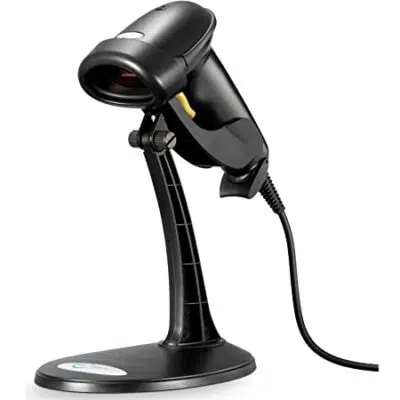Selecting the Right Barcode Scanner for Your Company Requirements
Picking the suitable barcode scanner for your company needs a nuanced understanding of your specific functional demands and ecological conditions. Factors such as scanner type, rate, and compatibility with existing systems play a critical function in establishing the right choice.
Recognizing Barcode Scanner Types
When it comes to choosing a barcode scanner, understanding the different types available is essential for meeting specific service demands. Barcode scanners can be classified right into a number of types, each created for various applications and settings.
Fixed-mount scanners, on the various other hand, are created for high-volume scanning applications, commonly discovered in setting up lines or checkout counters. These scanners are installed in a fixed placement, permitting for quick scanning of several items in succession.
One more type is the mobile computer, which combines scanning capabilities with computing power. These devices are excellent for area operations or storehouse management, allowing information collection and real-time supply tracking. Additionally, there are commercial scanners that are developed to withstand severe environments, such as severe temperatures or exposure to dust and moisture.

Trick Functions to Take Into Consideration
What essential features should organizations focus on when choosing a barcode scanner? Primarily, scanning rate is essential, as faster scanners boost operational effectiveness, especially in high-volume atmospheres. The scanner's capacity to read various barcode layouts is also important; guarantee it sustains prominent types like QR codes, UPC, and Code 128 to fit diverse supply things.
Sturdiness is another vital function, specifically for companies in sturdy settings. Search for designs that are constructed to stand up to decreases, dirt, and moisture. In addition, think about the connection choices readily available; whether you prefer USB, Bluetooth, or Wi-Fi, the ideal connection can enhance assimilation with existing systems.

Analyzing Your Organization Environment
To properly select a barcode scanner, companies have to analyze their details operational setting. This evaluation consists of examining the physical design of the work area, the nature of the items being scanned, and the regular conditions under which scanning happens. For example, a retail environment might call for handheld scanners that can swiftly refine purchases at the checkout, while a storehouse setting could take advantage of ruggedized scanners developed to endure harsher conditions.
Additionally, take into consideration the volume of scanning called for. High-throughput atmospheres might necessitate advanced scanning innovations, such as fixed-position scanners or mobile gadgets that can run efficiently in hectic scenarios. The assimilation capacities with existing stock administration systems likewise play an important role; make certain the selected scanner can flawlessly get in touch with software program systems in operation.
A scanner that satisfies current needs might not suffice as company expands. By completely examining these elements, companies can select a barcode scanner that not just meets instant demands but also supports lasting operational effectiveness and flexibility. barcodes scanners.
Budgeting for Your Scanner
Having analyzed the functional setting and determined the details requirements for a barcode scanner, the following step entails careful budgeting to guarantee a clever economic investment. Establishing a spending plan starts with identifying the overall expenses related to the scanner, including initial acquisition price, functional expenses, and potential maintenance fees.
When choosing a barcode scanner, take into consideration the variety of offered choices, from handheld tools to fixed-position scanners, as prices can differ dramatically. It is important to stabilize price with functionality; opting for an extra cost effective design may result in enhanced operational inadequacies if it does not satisfy your organization demands.
Along with the hardware, element in costs connected to software program, training, and potential upgrades. While it may be alluring to reduce upfront expense, investing in a quality scanner that aligns with your operational requirements can website link yield lasting savings with enhanced performance and decreased downtime.
Finally, consider the overall price of ownership, which incorporates the scanner's life-span and prospective resale worth. By carefully planning your budget plan, you can make sure that your financial investment in a barcode scanner will certainly enhance your functional performance and financial performance.
Integration With Existing Solution
Integrating a barcode scanner with your existing systems is vital for optimizing its efficiency and guaranteeing smooth operations. barcodes scanners. A well-integrated scanner improves workflow efficiency, lowers mistakes, and accelerates data processing. When look at this site choosing a barcode scanner, think about compatibility with your current software and hardware framework, including your supply management systems, point-of-sale (POS) systems, and enterprise source preparation (ERP) options
Examine whether the scanner utilizes typical protocols such as USB, Bluetooth, or Wi-Fi, which can promote easy assimilation. Additionally, evaluate whether the scanner's software application supplies APIs or SDKs that permit modification and assimilation with proprietary systems. This is especially important for services with one-of-a-kind operational needs.
Furthermore, think about the scalability of the scanning solution. As your service expands, your systems should be able to suit added scanners and manage increased data volumes without substantial reconfiguration. Inevitably, purchasing a barcode scanner that perfectly integrates with your existing systems will certainly generate lasting benefits, boosting accuracy, performance, continue reading this and general productivity within your operations. Take the time to completely analyze your combination needs before buying decision.

Verdict
In final thought, choosing a suitable barcode scanner requires a detailed examination of various aspects, consisting of scanner kinds, necessary functions, and the particular service environment. The right barcode scanner serves as a vital device in enhancing procedures and promoting efficient supply monitoring.